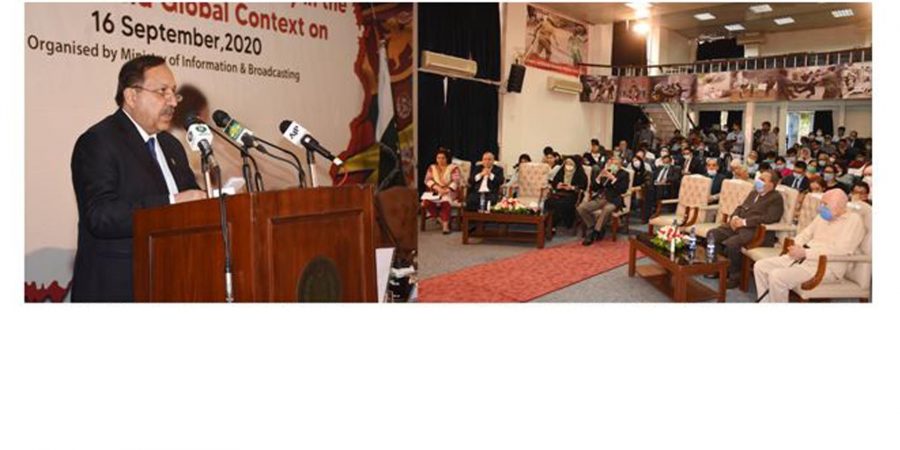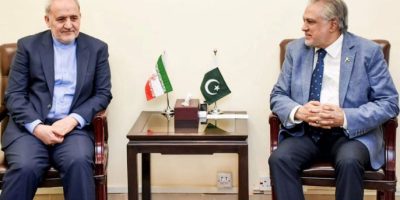India’s foreign policy designs serious threat: Info Secy

DNA
ISLAMABAD: Speakers at a Panel Discussion have said that India’s hegemonic foreign policy designs pose threat to peace in the region and beyond.
The Panel Discussion on “Decoding India’s Foreign Policy in the Regional and Global Context” was held in Islamabad today under the auspices of the Ministry of Information and Broadcasting.
They said Hindutva mind-set, hegemonic designs and domestic politics are the major contributing factors to India’s foreign policy.
In his remarks, Information Secretary Akbar Durrani said India is playing a dangerous game by its chauvinistic and hegemonic policy by flouting Indus Water Treaty, Simla Agreement and Ceasefire Agreement of 2003 between Pakistan and India.
He said time has come that the world should notice irresponsible and aggressive posturing of India causing instability and threat to peaceful coexistence at the regional and global context.
The Information Secretary said Pakistan believes in peaceful co-existence with all its neighbouring countries.
He said the world is acknowledging and appreciating Pakistan’s positive role in Afghanistan’s peace process. This is a clear manifestation of its commitment towards stable and peaceful Afghanistan but India is playing as spoiler and trying its best to sabotage the peaceful settlement of Afghan quagmire.
Speaking on the occasion, former Foreign Secretary Riaz Hussain Khokhar said all Indian leaders wanted to make India a hegemonic power in South Asia. However, he said, Pakistan happened to be an obstacle in this Indian dream. He said Modi wants to transform India into a Hindu state.
Riaz Khokhar said Indian government has been carrying out ruthless killing of innocent people in Indian illegally occupied Jammu and Kashmir. He said Pakistan should provide full spectrum support to the Kashmiris in their just struggle for freedom. He regretted that the world conscience is not awakening over the gross human rights violations in Indian illegally occupied Jammu and Kashmir.
Former Foreign Secretary Salman Bashir said India is more isolated within the region today than ever before. He said India’s relations with Bangladesh, Sri Lanka, Nepal and Bhutan have turned bad. He said China has sent a strong message over Laddakh episode that India should not commit any strategic blunder. He said Indian union is fragile with one third of its territory under insurgency. He said Indian government’s Hindutva mind-set is taking the country to dark ages.
On the other hand, Salman Bashir said, Pakistan is well situated in the region and has many avenues to grow stronger. He said China, which is a trusted friend of Pakistan, has been providing full support to Pakistan.
Taking part in the debate, Pakistan’s former High Commissioner to India Aziz Ahmed Khan said India had to face a setback in Laddakh when its hegemonic designs were defeated by China. He said India took a brutal act on August 5 last year when it revoked the special status of Jammu and Kashmir, and the world took its notice. He said all Kashmiri leaders are against the present Indian government.
Aziz Ahmed Khan said the Pakistani parliamentarians, particularly women, should be sent to various countries to meet their counterparts and apprise them of the human rights violations in Indian illegally occupied Jammu and Kashmir. He said the civil society organizations, India, and Kashmiri Diaspora have important roles in this regard.
Former Ambassador Asif Durrani said regionally India has pursued hegemonic policies, but resultantly, none of India’s neighbour is happy with it. He said since 2014, Hindutva agenda is being followed in India, which has led to tensions with its neighbours. He said Pakistan has proved that India’s efforts to isolate it have failed. He said India is also playing as a spoiler in Afghanistan. He emphasized on intellectual work in Pakistan to strengthen its narrative on Kashmir issue.
Related News

India-sponsored Daesh affiliate behind Islamabad attack in custody, confirms Naqvi
ISLAMABAD, FEB 7: Interior Minister Mohsin Naqvi on Saturday confirmed that the mastermind of theRead More

Dar, Iranian envoy reaffirm joint resolve to combat terrorism
ISLAMABAD, FEB 7 (DNA): Deputy Prime Minister/Foreign Minister Senator Mohammad Ishaq Dar, Saturday, reiterated Pakistan’sRead More


Comments are Closed